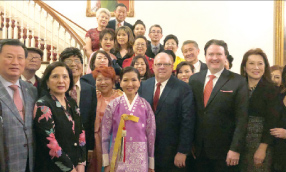“Trump’s Proposed Steel and Aluminum Tariffs Target China”
▶ “Excessively Produced Chinese Products Flooding the World, Affecting the U.S. Market”

President Trump announced the plan to impose an additional 25% tariff on all steel and aluminum products imported into the U.S. during a conversation with reporters aboard Air Force One the previous day.
Although China is not among the top exporters of steel and aluminum to the U.S., its "overproduced" products are being sold at lower prices in the global market, negatively impacting the fragile U.S. domestic steel industry. This prompted President Trump to take action with steel and aluminum tariffs targeting the entire world, as diagnosed by NYT.
As of January, the top five countries exporting steel to the U.S. are Canada, Brazil, Mexico, South Korea, and Germany, with China absent from the list.
In September of the previous year, then-President Joe Biden had already raised tariffs on Chinese steel and aluminum to 25%, resulting in a decline in China's steel and aluminum exports to the U.S.
While direct exports of Chinese steel to the U.S. are not substantial, the NYT noted that the flood of cheap Chinese products into global markets, including Canada and Mexico, is assisting these countries’ exports to the U.S. In response to China's underperforming domestic economy, overproduced steel and aluminum are being exported cheaply to U.S. allies such as Canada and Mexico, enabling these countries to increase their own steel and aluminum exports to the U.S.
The NYT also reported that countries like Canada and Mexico can now use the low-priced steel and aluminum imported from China for domestic consumption, allowing them to export more of their own production to the U.S. at higher prices.
In the case of Vietnam, large quantities of semi-finished products are being imported from China, processed into finished products, and then re-exported as "Vietnamese" goods.
Ultimately, Chinese overproduction, resulting from weak domestic demand due to the slump in China’s construction industry, is flooding global markets at low prices, affecting the U.S. steel industry.
According to the NYT, the U.S. is not the only country responding to the overproduction of Chinese steel and aluminum with tariffs. Brazil, Canada, Indonesia, and Turkey have also raised tariffs on Chinese steel products in the past year.
스마터리빙
more [ 건강]
[ 건강]이제 혈관 건강도 챙기자!
[현대해운]우리 눈에 보이지 않기 때문에 혈관 건강을 챙기는 것은 결코 쉽지 않은데요. 여러분은 혈관 건강을 유지하기 위해 어떤 노력을 하시나요?
 [ 건강]
[ 건강]내 몸이 건강해지는 과일궁합
 [ 라이프]
[ 라이프]벌레야 물럿거라! 천연 해충제 만들기
 [ 건강]
[ 건강]혈압 낮추는데 좋은 식품
[현대해운]혈관 건강은 주로 노화가 진행되면서 지켜야 할 문제라고 인식되어 왔습니다. 최근 생활 패턴과 식생활의 변화로 혈관의 노화 진행이 빨라지고
로컬뉴스
more
서울대 뉴욕북클럽 정기토론회
서울대 뉴욕북클럽(대표 신응남)은 지난 13일 퀸즈 베이사이드 거성 식당에서 정기토론회를 개최했다. 이날 참석자들은 연암 박지원의 ‘열하일기’…

대한민국재향군인회 신상태 회장 초청 모임
대한민국재향군인회 미북동부지회(회장 배광수)는 16일 퀸즈 플러싱 함지박 식당에서 대한민국 재향군인회 신상태(앞줄 왼쪽 5번째) 회장 초청 모…
FIT서 주요 무형유산 시연 웍샵
국가무형유산 장인 및 이수생 12명이 뉴욕 패션스쿨 ‘FIT’를 방문, 주요 무형유산을 시연하는 웍샵을 가졌다. 워싱턴 DC 주미대한제국공사관…
사진작가 제이 안, 뉴욕한인회관서 개인전 예정
뉴욕 출신 한국 사진작가 제이 안씨가 지난 5~16일까지 퀸즈 칼리지포인트 갈라아트센터에서 초대전을 가진 후 뉴욕한인회를 방문했다. 안 작가는…
소콜리치 포트리 시장 사랑의 터키 재단에 후원금
마크 소콜리치(오른쪽) 뉴저지 포트리 시장이 한국일보 특별후원으로 사랑의 터키·쌀보내기 운동을 전개해온 사랑의 터키 한미재단의 전상복 회장에 …
많이 본 기사
- 영어교재 ‘이것이 미국영어다’ 저자 조화유씨 별세
- 셧다운때 개근한 항공관제사 776명에 1만달러 보너스
- ‘고물가 비상’ 트럼프, 브라질 농산물에 40% 추가관세 면제
- 래퍼 프라스 미셸, ‘오바마 선거자금 불법기부’ 징역 14년형
- 野의원-트럼프 SNS충돌… “불법명령 거부해야” vs “사형감 반란”
- [건강포커스] “먹는 GLP-1 치료제, 당뇨·비만 환자 체중·혈당 개선 효과”
- ‘美 블랙리스트’ 러 국영 에너지기업, 세르비아 자산 매각 나서
- 체니 전 부통령 장례식에 부시·바이든 참석…트럼프 불참
- 민주 지한파 중진 “한일, 역사와 전략적 문제 분리하길”
- “워너 인수전…넷플릭스·컴캐스트·파라마운트 3파전 돌입”
- 법원, 트럼프의 워싱턴DC 주방위군 투입 제동… “자치권 훼손”
- 오픈AI, 미국내 데이터센터 박차…폭스콘과 하드웨어 설계 협업
- 380만 건 적체에 멈춘 이민법원… 한인들 ‘신분 위기’
- 하루 남은 유엔 기후총회, 화재 겹치며 ‘합의 난망’
- 토랜스 제일장로교회 EM 목사, 부당해고 소송
- 뉴욕증시, 젠슨 황도 못 구했다…기술주 투매에 동반 하락 마감
- 美 “우크라戰 종전안 우크라에도 설명…러·우 모두 수용가능”
- 李대통령 “韓-중동 상생의 공동비전… ‘SHINE 이니셔티브’ 제안”
- 신민아♥김우빈, 결혼식은 신라호텔에서..전지현·김연아 이어 ‘철통보안 웨딩’
- 스포츠계도 트럼프 눈치?…LA올림픽조직위 친트럼프 인사 영입
- 구글, 이미지 AI도구 ‘나노바나나 프로’ 출시…한글 표현도 깔끔
- “임금 미지급 시 최대 3배 벌금… 주 고용법 강화”
- 가주 주지사 경선구도 ‘안갯속’ 1
- 美, 이란산 원유 판매업체 등 제재… “핵개발 자금줄 차단”
- 하이브리드로 더 강해진 ‘SUV의 왕’… 기아, 2027년형 올 뉴 텔루라이드 LA에서 첫 공개”
- 재융자 기회 돌아왔나?… 이자율 인하에 재융자 관심↑
- ICE, 뉴욕주법원서 이민단속 못한다
- 고령층 노린 보이스피싱 자금세탁
- 월마트, 소비심리 악화속 호실적… “고소득 고객유입 증가”
- 기아 “美 텔루라이드 인기로 브랜드↑…2세대 출시로 성장 가속”
- MD 최저임금 25달러 되나?
- “북은 위험…비핵화 시도 포기해서는 안돼”
- 데이터센터 더 빨리 짓자… “소프트뱅크, 장비공장 30억 달러 투자”
- ‘포트2 확정’ 홍명보호 입장도 바뀌었다, 실현 바라야 하는 ‘이탈리아 루머’
- 은영재 전 VA한인회장, 징역 6월·… 1
- 네이처셀, 볼티모어에 줄기세포치료제 생산거점 구축한다
- ‘코치 인종차별 중징계’ 이승우 간절 호소 “더 깊이 있게, 정확하게 다시 살펴봐 달라”
- 美 “G20 정상선언 채택말라”…의장국 남아공은 “굴복 안해”
- 한인 마켓도 덮친 ‘대대적 이민 단속’
- 탁재훈, 아들 얼굴 공개..美 명문대 재학·남다른 피지컬 자랑
- 50년 상환 모기지?… 전문가들 “득보다 실이 크다”
- 홍장원, 공방전 尹 면전서 “피고인, 부하한테 책임 전가하냐”
- 로보택시 경쟁 가열… 아마존 죽스 가세
- 월세 대신 자산 만드는 방법
- “韓, 국제사회에 ‘핵무기 개발 안한다’ 선제적 입장 표명 필요”
- “정기적인 음악 감상… 치매 위험 감소와 관련”
- 홍명보호 올해 일정 끝… 중원조합·수비불안 ‘해결 과제’
- FCC, BBC 트럼프 연설 편집 조사… “기만적 행위”
- “교통사고시 이렇게 대처해야”...버클리법률그룹, 세미나서 실속법률정보 쏟아져
- 불법 마사지업소 단속 칼 빼들었다
1/5지식톡

-
 테슬라 자동차 시트커버 장착
0
테슬라 자동차 시트커버 장착
0테슬라 시트커버, 사놓고 아직 못 씌우셨죠?장착이 생각보다 쉽지 않습니다.20년 경력 전문가에게 맡기세요 — 깔끔하고 딱 맞게 장착해드립니다!장착비용:앞좌석: $40뒷좌석: $60앞·뒷좌석 …
-
 식당용 부탄가스
0
식당용 부탄가스
0식당용 부탄가스 홀세일 합니다 로스앤젤레스 다운타운 픽업 가능 안녕 하세요?강아지 & 고양이 모든 애완동물 / 반려동물 식품 & 모든 애완동물/반려동물 관련 제품들 전문적으로 홀세일/취급하는 회사 입니다 100% …
-
 ACSL 국제 컴퓨터 과학 대회, …
0
ACSL 국제 컴퓨터 과학 대회, …
0웹사이트 : www.eduspot.co.kr 카카오톡 상담하기 : https://pf.kakao.com/_BEQWxb블로그 : https://blog.naver.com/eduspotmain안녕하세요, 에듀스팟입니다…
-
 바디프렌드 안마의자 창고 리퍼브 세…
0
바디프렌드 안마의자 창고 리퍼브 세…
0거의 새제품급 리퍼브 안마의자 대방출 한다고 합니다!8월 23일(토)…24일(일) 단 이틀!특가 판매가Famille: $500 ~ $1,000Falcon: $1,500 ~ $2,500픽업 & 배송직접 픽업 가능LA…
-
 바디프렌드 안마의자 창고 리퍼브 세…
0
바디프렌드 안마의자 창고 리퍼브 세…
0거의 새제품급 리퍼브 안마의자 대방출 한다고 합니다!8월 23일(토)…24일(일) 단 이틀!특가 판매가Famille: $500 ~ $1,000Falcon: $1,500 ~ $2,500픽업 & 배송직접 픽업 가능LA…
케이타운 1번가
오피니언
 수잔 최 한미가정상담소 이사장 가정법 전문 변호사
수잔 최 한미가정상담소 이사장 가정법 전문 변호사 [수잔 최 변호사의 LIFE &] 서울 가을 자락에서 만난 쉼터
 강민수 을지대 첨단학부 교수 한국인공지능학회장
강민수 을지대 첨단학부 교수 한국인공지능학회장 [기고] 디지털 주권의 토대, 소버린 클라우드
 이숙종 성균관대 국정전문대학원 특임교수
이숙종 성균관대 국정전문대학원 특임교수 [백상논단] 젠지혁명와 유스 액티비즘
 박연실 수필가
박연실 수필가 [윌셔에서] 틈과 행간 사이를 서성이며
 이동현 / 한국일보 논설위원
이동현 / 한국일보 논설위원[지평선] 타이레놀과 아세트아미노펜

[왈가 왈부] ‘한미협상 국회 비준’ 갑론을박… 외교는 ‘국익’이 먼저죠
 정숙희 논설위원
정숙희 논설위원사라진 백악관의 이스트 윙
 파리드 자카리아 워싱턴포스트 칼럼니스트 / CNN ‘GPS’ 호스트
파리드 자카리아 워싱턴포스트 칼럼니스트 / CNN ‘GPS’ 호스트 계속되는 민주당의 헛손질
 김동찬 시민참여센터 대표
김동찬 시민참여센터 대표 [미국은 지금] 미국 정치의 파산과 그 댓가
1/3지사별 뉴스

ICE, 뉴욕주법원서 이민단속 못한다
뉴욕주법원이나 로컬법원 주변에서 빈번하게 이뤄지고 있는 연방 당국의 이민자 단속에 제동이 걸렸다.연방법원 뉴욕북부지원은 지난 17일 연방법무부…
트럼프, “외국인 전문인력 필요” 재차 강조

“북은 위험…비핵화 시도 포기해서는 안돼”
조지타운대 국제대학원의 한국정책클럽(KPC, 회장 문요한)은 지난 18일 트럼프 1기 행정부에서 대북특사를 역임했던 마크 램버트(Mark La…
MD 최저임금 25달러 되나?

오프라인 한국어 과정 성공적 마무리 단계
샌프란시스코 한국 교육원(허혜정 원장)이 2025년 가을 학기에 처음 개설한 오프라인 한국어 과정 ‘한국어 1’이 오는 22일 성공적인 마무리…
마라나타 비전교회, 장로/안수집사 임직및 장로 은퇴예배

오늘 하루 이 창 열지 않음 닫기 


















































.png)


댓글 안에 당신의 성숙함도 담아 주세요.
'오늘의 한마디'는 기사에 대하여 자신의 생각을 말하고 남의 생각을 들으며 서로 다양한 의견을 나누는 공간입니다. 그러나 간혹 불건전한 내용을 올리시는 분들이 계셔서 건전한 인터넷문화 정착을 위해 아래와 같은 운영원칙을 적용합니다.
자체 모니터링을 통해 아래에 해당하는 내용이 포함된 댓글이 발견되면 예고없이 삭제 조치를 하겠습니다.
불건전한 댓글을 올리거나, 이름에 비속어 및 상대방의 불쾌감을 주는 단어를 사용, 유명인 또는 특정 일반인을 사칭하는 경우 이용에 대한 차단 제재를 받을 수 있습니다. 차단될 경우, 일주일간 댓글을 달수 없게 됩니다.
명예훼손, 개인정보 유출, 욕설 등 법률에 위반되는 댓글은 관계 법령에 의거 민형사상 처벌을 받을 수 있으니 이용에 주의를 부탁드립니다.
Close
x